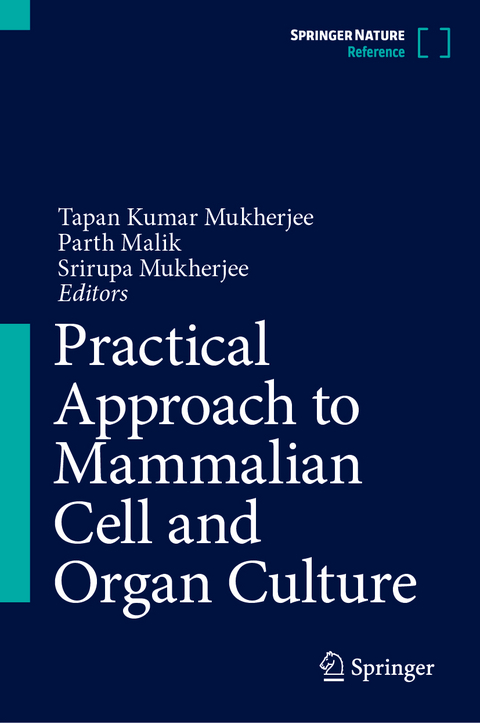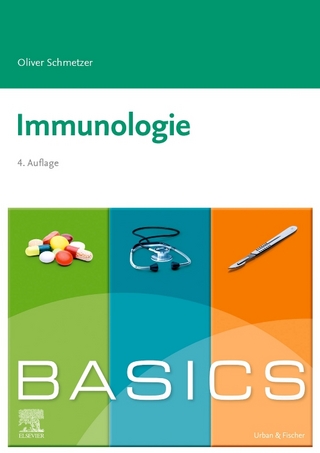
Practical Approach to Mammalian Cell and Organ Culture
Springer Verlag, Singapore
978-981-19-1730-1 (ISBN)
In addition, the book addresses the various problems encountered while culturing animal cells, their possible causes, and suggested solutions, presenting detailed protocols for isolation and primary culturing of various mammalian cells and hematoimmunologic organs in two dimensions.
Lastly, it reviews the various applications of animal-cell culture, stem-cell culture, and tissue and organ culture. As such, this reference book is highly relevant for students and professionals new to cell-culture work as well as to those wishing to expand their skills from cell-line cultures to primary cultures and from conventional 2D cultures to 3D cultures.
Dr. Tapan Kumar Mukherjee completed his graduation and post-graduation in Human Physiology with 1st class from Kolkata University, India. He has a Ph.D. in Human Physiology from Bose Institute, a Department of Science and Technology (DST), Government of India organization. Following his Ph.D., Dr. Mukherjee further enriched his research expertise during his postdoctoral stints at the Center for Cellular and Molecular Biology (CCMB), Hyderabad, India, and the Department of Molecular and Medical Pharmacology, University of California, Los Angeles (UCLA). He has faculty experience from internationally renowned Institutes like the University of Utah, Salt Lake City, USA, Indian Institute of Science Education and Research (IISER), Mohali, Punjab, India, and Maharishi Markandeshwar University, Mullana, Haryana, India. Presently, he is working as a Professor at the Institute of Biotechnology, Amity University, Noida, UP, India. Dr. Mukherjee has visited the Korea Research Instituteof Bioscience and Biotechnology (KRIBB), South Korea, and the National University of Singapore (NUS), Singapore. He has been awarded a national scholarship from Kolkata University and DST post-doctoral fellowship (sponsored) at CCMB, Hyderabad, India. On the research front, his primary interest is deciphering the cell signaling molecules involved in the complication of cancer and cardiovascular diseases. His expertise involves the application of Molecular Medicine Protocols to control these diseases. Dr. Mukherjee has received several research grants from the Indian Council of Medical Research (ICMR), the Department of Biotechnology (DBT), and the Department of Science and Technology (DST), the ix Government of India. He has several research publications in first-rated international journals including three in PNAS (USA), Journal of Biological Chemistry, Journal of Immunology, Cellular Oncology, Nanobiotechnology, and Life Sciences, and several in Biochemica et Biophysica Acta (BBA) Molecular Cell Research, Biochemical Journal, Infection Immunity, BBRC, etc. He has also contributed to writing Encyclopedias from Springer and Elsevier and book chapters in international publication houses like Springer, Nova Science Publishers, Pan Stanford Publishers, and Bentham Science. He has trained numerous students and Ph.D. candidates. His dedication, devotion, and undisputable academic consistency earned him the best teacher award. Dr. Parth Malik holds a graduation in Biotechnology and a post-graduation in Nanobiotechnology interface (domain). After being awarded M.Tech. in 2011, he devoted a year to sharpening his teaching and research skills in the Department of Biotechnology, Maharishi Markandeshwar University, Mullana (Ambala, India). It was in this duration that Dr. Malik enhanced his scientific writing and creative thinking in the domain of “Understanding biochemical significance and functional correlations of free radicals and antioxidants,” aroused by manifold encouraging discussions with Prof. Mukherjee. Subsequently, he left for Central University of Gujarat in 2012, where he completed his M.Phil. and Ph.D. in the School of Nano Sciences, in 2018. He has a rich experience in the preparation of low energy-based oil-in-water emulsions to enhance the antioxidant expressions of natural bioactive compounds. His major research work is on optimizing the antioxidant efficacy of polyphenolic antioxidant curcumin, via nano- and microemulsions of cottonseed, peanut, mustard, and linseed oils. His association with Prof. Mukherjee as well as with Prof. Man Singh (Ph.D. supervisor) is the reason for his cemented expertise in the subject areas of antioxidants and free radical dynamics and Physicochemical characterizations of emulsions, respectively. Dr. Malik has attained success in publishing his research works on curcumin nanoemulsions with variable surfactants, characterized by their temperature-optimized x About the Editors physicochemical activities, and developing the most authentic structure-activity relationships. Two primitive aspects of his research work comprise developing solutions to low bioavailability-hindered impaired structural expression of natural polyphenols through facilitating their sustained expression and exploring the commonality of physicochemical modulations with structural expressions of dispersed phases. It is no more a surprise now that efficient (> 70%) free radical scavenging activities could be attained even with >1000 nm particle sizes, where self-assembly-driven molecular controls could supersede. His overall research expertise comprises overlapping boundaries of oxidative stress mitigation, nanoemulsions preparation and optimization for improving the structural expression of low bioavailability compounds, physiochemical interpretations of dispersion stability, nanobiotechnology, biosensors, and the use of biocompatible and structurally robust materials to improve dispersion potential ofemulsions. Dr. Srirupa Mukherjee completed her post-graduation in Biochemistry with 1st class from Kolkata University, India. Subsequently, she was awarded a Ph.D. from the Indian Institute of Chemical Biology (IICB), a Council of Scientific and Industrial Research (CSIR) Organization, Government of India. She has availed of Junior and Senior Research Fellowship (JRF and SRF) grants from CSIR, Government of India. Dr. Mukherjee has several years of successive post-doctoral training experience, from the University of Iowa, the University of California, Los Angeles (UCLA), and the University of Utah, USA. After completing her post-doctoral training, Dr. Mukherjee returned to India and joined the Indian Institute of Science Education and Research (IISER), Mohali, as a Senior Research Associate. Presently she is working as a DST Women Scientist at the Post-Graduate Institute of Medical Education and Research (PGIMER), Chandigarh, India. Dr. Mukherjee has expertise in several research domains comprising host-pathogen interactions, atherosclerosis, and respiratory biology. She has also written several book chapters in eminent books reviewed and edited by renowned global experts associated with reputed international publishers. She has several international publications in eminent scientific journals, encompassing About the Editors xi Vaccines, Atherosclerosis Thrombosis and Vascular Biology (ATVB), Biochimica et Biophysica Acta (BBA), Journal of Parasitology, Journal of Immunology, Respiratory Research, Clinical and Vaccine Immunology (CVI), etc. She has trained numerous project fellows, and several Ph.D. students are perusing their research work under her able guidance.
Mammalian Cell Culture: An Overview.- Establishment of a Cell Culture Laboratory.- Mammalian Cell Culture Laboratory: Equipment and Other Materials.- Common Reagents and Medium for Mammalian Cell Culture.- Microbial Contamination of Mammalian Cell Culture.- Mammalian Cell Culture Types and Guidelines for Their Maintenance.- Isolation and Purification of Various Mammalian Cells: Single Cell Isolation.- Isolation and Primary Culture of Various Mammalian Cells.- Primary Culture of Immunological Cells.- Culture of Neuron and Glia Cells.- Culture of Continuous Cell Lines.- Stem Cell Culture and Its Applications.- Mammalian Cell Culture in Three Dimensions: Basic Guidelines.- Organ, Histotypic and Organotypic Culture, and Tissue Engineering.- Large-Scale Culture of Mammalian Cells for Various Industrial Purposes.- Experimental Mammalian Cell Culture-Based Assays.- Mammalian Cells, Tissues and Organ Culture: Applications.- Biosensors’ Utility in Mammalian Cell Culturing.- Nanomaterials:Compatibility Towards Biological Interactions.- Review on IPR and Technological Advancements in Nanotechnology for Nanomedicine.- Emerging Drug Delivery Potential of Gold and Silver Nanoparticles to Lung and Breast Cancers.- Mammalian Cells: Reliability as Model System in the Ecotoxicological Evaluation of Environmental Stressors.- Bioimaging: Usefulness in Modern Day Research.- Troubleshooting of Mammalian Cell Culture.
| Erscheinungsdatum | 16.05.2023 |
|---|---|
| Reihe/Serie | Practical Approach to Mammalian Cell and Organ Culture |
| Zusatzinfo | 147 Illustrations, color; 114 Illustrations, black and white; XIV, 1288 p. 261 illus., 147 illus. in color. In 2 volumes, not available separately. |
| Verlagsort | Singapore |
| Sprache | englisch |
| Maße | 155 x 235 mm |
| Themenwelt | Studium ► Querschnittsbereiche ► Infektiologie / Immunologie |
| Naturwissenschaften ► Biologie ► Genetik / Molekularbiologie | |
| Naturwissenschaften ► Biologie ► Zellbiologie | |
| ISBN-10 | 981-19-1730-2 / 9811917302 |
| ISBN-13 | 978-981-19-1730-1 / 9789811917301 |
| Zustand | Neuware |
| Haben Sie eine Frage zum Produkt? |
aus dem Bereich


